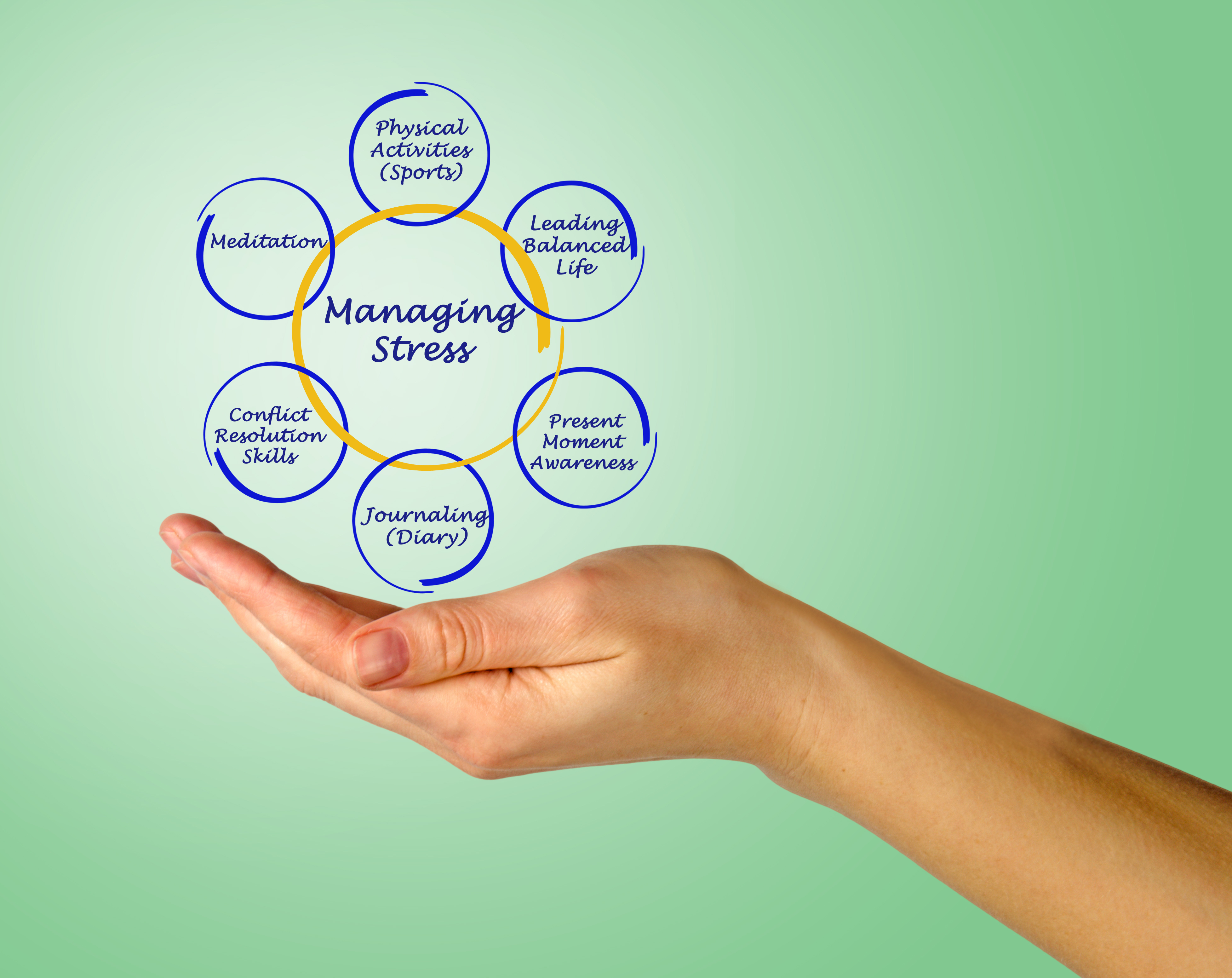
Stress and Stress Management
12 minute read
Stress is a part of life. It's an inevitable response to the pressures and uncertainties that we face every day. But if left unchecked, stress can take its toll on our physical and mental health. So it's essential to understand how to manage it properly.
That's why understanding stress and its management is so vital for leading a healthy lifestyle. In this article, we'll look at what stress is, how it affects us, and which strategies you can use to help cope with it in everyday life.
We all have an innate desire for safety - both mentally and physically. Stress management allows us to create a sense of control over our lives to help alleviate some of those worries and anxieties. By learning more about stress and its effects on your body, mind, and behaviour, you'll be better equipped to tackle any challenge that comes your way!
1. Different Types Of Stress
There are many types of stress, each with its unique characteristics and implications. Mental stress is a feeling that results from the pressure to perform or expectations placed upon us in our daily lives. Physical stress can take the form of pain caused by an injury or illness, discomfort due to changes in temperature, or fatigue due to inadequate rest. Emotional stress involves intense psychological distress, such as fear, worry, anger, guilt, depression, and loneliness. All these forms of stress have short-term and long-term effects on our physical and mental well-being.
In addition to these three main categories of stressors, circumstantial stresses arise from external events such as money problems, relationship issues, job loss, etc., all of which can be equally debilitating. It is vital for us to recognise the various sources of stress so we can better manage it when it arises. By understanding what kind of situation causes us anxiety and how best to cope with it, we can find ways to reduce its impact on our lives.
We must remember that while some level of stress is inevitable in life, excessive levels can lead to severe consequences if left unchecked. Therefore we must learn healthy coping strategies for dealing with stressful situations effectively before they become overwhelming.
2. Causes Of Stress
Stress can be a tricky thing to deal with. It can slip into our lives uninvited, leaving us feeling overwhelmed and finding it difficult to cope with the demands of everyday life. But what causes this stress? Let's look closely at some of the common sources of stress in today's world.
The first source of stress is money-related issues - from being unable to pay bills on time or having too much debt; these problems create an intense strain for many people. Then there are job pressures – whether it's an overly demanding boss or constantly ensuring that you meet deadlines, both can weigh heavily upon your shoulders. And let's not forget social media pressure – trying to project yourself as 'perfect' when no one actually is. All these factors contribute towards feelings of anxiety and tension that lead to physical illnesses such as headaches and insomnia.
Relationships also play an important role in inducing stress levels within individuals - from breakups to arguments between family members; all these scenarios can cause emotional turmoil, which may become difficult to manage without outside help. Social situations like attending intimidating events alone or dealing with annoying co-workers can add fuel to the fire, making it hard for us to stay composed and collected during tough times.
As we further explore our understanding of how we experience stress, let's delve into its signs and symptoms.
3. Signs And Symptoms Of Stress
Whenever our minds are overwhelmed, it can feel like we're sinking into an ocean of stress, like a ripple on the surface of the water; signs and symptoms of stress manifest in many different ways - some more obvious than others. It's important to recognise these warning signals so that you can make proactive steps towards managing your stress levels before they become too overwhelming.
When someone is experiencing high levels of stress, physical reactions can be seen through changes in the body, such as headaches and muscle tension. Some people may also find themselves feeling flushed or having difficulty sleeping. Cognitively, one might experience racing thoughts or negative self-talk; while emotionally, this could present itself as low energy and irritability. Additionally, behavioural responses include procrastination and avoidance of activities which used to bring joy or satisfaction before becoming stressed out. All these vibrations indicate when something isn't quite right within us – like a red flag waving from atop a lighthouse standing tall against turbulent waters.
Stressful situations come with their own unique set of challenges – but there are always opportunities for growth amidst them too! Becoming aware of our individual triggers and recognising early symptoms allows us to better equip ourselves for sailing life's choppy seas. With knowledge comes power: the power to build resistance against future waves crashing down upon us and protect our well-being along the way. Ready now to explore what health risks come with unmanaged stress? Let's take this voyage together...
4. Health Risks Of Unmanaged Stress
Unmanaged stress can be dangerous and even deadly in some cases. According to the American Psychological Association, 75% of all health problems are due to stress, which is why it's essential for individuals to understand the risks of ignoring this issue.
When left unchecked, stress can lead to various physical and mental health issues such as depression, anxiety, heart disease, stroke, increased blood pressure, gastrointestinal issues like ulcers or irritable bowel syndrome (IBS), sleep disturbances, and weakened immunity. It can also cause unhealthy behaviours such as smoking cigarettes or drinking alcohol excessively in an effort to cope with overwhelming emotions.
The risk of experiencing serious consequences from unmanaged stress increases exponentially if individuals don't practice healthy coping strategies. Commonly used methods include mindfulness techniques such as meditation and yoga; talking with friends or family members about worries; exercising regularly; keeping a journal; taking breaks throughout the day where possible; getting enough restful sleep each night; being mindful of what one eats; participating in activities that bring joy; seeking professional help when necessary; and having fun. By developing healthier ways to manage stress levels more effectively, people can begin to live longer, happier lives free from worry and fear.
Making these changes isn't always easy, but by doing simple things like setting aside time for self-care every day – whether reading a good book or simply taking five minutes for yourself - individuals will start feeling better mentally and physically. Ready to take control? Let's look at how we can develop those healthy coping strategies now...
5. Developing Healthy Coping Strategies
The idea that developing healthy coping strategies can help us in times of stress has long been accepted. Studies have repeatedly found that people who use positive and constructive channels to cope with difficult situations are more likely to feel better emotionally, both short-term and long-term. While there is no one-size-fits-all solution for everyone, some techniques may be especially helpful in managing stress.
For instance, mindfulness practices such as meditation or yoga can help individuals become aware of their thoughts and feelings without judgment. This practice helps cultivate a sense of calm amidst chaos and lets us observe our emotions objectively. Additionally, engaging in physical activity like jogging or playing sports can stimulate endorphins – naturally occurring hormones known to improve moods and decrease anxiety levels. Moreover, talking about our problems with others can provide emotional support from those close to us while helping us gain insight into our stressful situation.
Taking time out for relaxation activities, such as listening to music or going on walks outdoors, also manage stress effectively. These activities give us much-needed space away from whatever is causing distress, thereby allowing us to reset mentally and physically before tackling the issue again. With these tools at our disposal, we can move forward feeling refreshed and ready to take on any challenge life throws at us - enabling us to identify unhealthy stress management habits which might otherwise go unnoticed until they manifest into something worse down the road.
6. Identifying Unhealthy Stress Management Habits
Identifying unhealthy stress management habits is important to understanding and managing stress. While relying on them as a quick fix may be tempting, these strategies can often backfire and make the situation worse in the long run. To ensure that you are taking care of yourself both physically and mentally, here are five common signs of unhealthy coping mechanisms:
1) Relying heavily on drugs or alcohol to numb your emotions;
2) Avoiding social contact with friends and family members;
3) Engaging in risky behaviours like gambling or reckless driving;
4) Turning to food for comfort when feeling overwhelmed;
5) Ignoring feelings by working excessively or watching too much television.
If any of these sound familiar, it's time to take action. Unhealthy coping habits can have serious consequences if left unchecked, such as damaging relationships, physical health problems, financial issues, legal trouble, and more. The key is developing healthier alternatives instead so that you don't fall into harmful patterns that worsen your well-being over time.
It's also beneficial to recognise early warning signs before they spiral out of control. That way, you can intervene quickly with positive activities or self-care rituals designed to counterbalance negative behaviour. From there, it might be helpful to seek professional help for stress management if needed—a qualified counsellor can provide valuable insight about managing difficult emotions moving forward.
7. Professional Help For Stress Management
It can be challenging to manage stress on our own. Even with the help of family and friends, it's sometimes not enough. Professional help for stress management is often necessary when we don't have the resources or skills to cope with stressful situations ourselves.
We need someone who understands us and knows how to help us find solutions that best fit our individual needs. They can provide a safe space where we feel comfortable expressing our feelings without judgement or criticism. With their support, we are able to identify unhealthy habits that might otherwise go unnoticed and replace them with healthier coping mechanisms that work better for us.
With professional guidance, we can also learn new tools to use during times of high stress, such as relaxation techniques, problem-solving strategies, and communication methods - all of which can significantly improve our ability to deal with challenging circumstances effectively and constructively. By investing in professional assistance for managing stress, we can set ourselves up for long-term success in maintaining positive mental health and well-being. Ready now to explore tips for long-term stress management?
8. Tips For Long-Term Stress Management
When it comes to long-term stress management, there are several approaches you can take. Firstly, developing an understanding of the causes and triggers of your stress is a great place to start. This will help you identify situations that may be causing or exacerbating your stress levels and how best to manage them in the future.
Another key factor in successful long-term stress management is establishing healthy coping mechanisms. For example, regular exercise has been proven to positively impact mental well-being and reduce feelings of anxiety. Mindfulness meditation can also help alleviate tension by teaching us how to focus our thoughts more positively.
It's important not to underestimate the power of taking time out for yourself, too – this could include things such as listening to music, reading a book or having a relaxing bath after a stressful day at work. Having some 'you' time can provide much-needed relief from life's challenges and enable you to cope better with any potential difficulties that come up down the line.
Frequently Asked Questions
What Are The Most Common Sources Of Stress?
Stress is an unavoidable part of life. It can be a good thing, pushing us to achieve our goals and stay motivated; however, it can also become overwhelming if we don't manage it appropriately. So what are the most common sources of stress? To answer this question, let's delve into the world of emotions and pressures we all face in day-to-day life.
From work demands to relationship issues – there's no shortage of things that can cause us anxiety. Financial problems may cause us to worry about making ends meet or paying off debt. Health worries such as chronic illness or long-term disability add another layer of stress on top of everything else. Even positive changes like starting a new job or getting married can come with their own set of challenges which need to be managed effectively for them to remain positive experiences.
Addressing these different sources of stress requires self-awareness and careful consideration: understanding when they arise, why they arise and looking at ways to address them properly so that we don't get overwhelmed by them and lose sight of the bigger picture. This could mean talking through your feelings with friends or family members, taking time out for yourself, engaging in activities you enjoy doing - whatever works best for you! Awareness of our emotional state helps us take action before any situation becomes too much to handle.
How Can Stress Be Prevented?
Stress prevention is a crucial component of any successful stress management plan, but it's all too often overlooked in favour of the more glamorous techniques such as yoga and meditation. But why? After all, isn't prevention better than cure? So why not take steps to avoid stress before it even has a chance to take hold? That's what we should be asking ourselves!
In this era of 'busyness,' avoiding stressful situations can seem impossible. Yet there are some simple strategies that anyone can use to reduce their risk of becoming overwhelmed with stress.
For starters, try setting realistic goals for yourself – don't put pressure on yourself by aiming for perfection or trying to achieve things you know will be difficult.
Secondly, ensure you're getting enough rest each night; lack of sleep can wreak havoc on your physical and mental health.
Finally, find activities that bring you joy – whether that means taking up a hobby or going out with friends – and make time for them every week.
Nowadays, many people feel they have no control over life's stresses—but that's simply not true! Taking proactive steps towards preventing stress may require some effort initially but will ultimately pay off in terms of improved physical and mental well-being. So why wait until your life starts feeling overwhelming before attempting something about it? Instead, take charge now and get ahead of the game regarding managing your stress levels!
The Lifestyle Changes You Can I Make To Reduce Stress?
Stress can be a debilitating and consuming force in our lives, casting its dark shadow over us like an oppressive cloud. This feeling of anxiety or tension will inevitably come up from time to time, but it doesn't have to take control of your life if you don't let it. With some lifestyle changes, you can break the cycle of stress and build a more positive mindset.
Making minor adjustments to your daily routine can make all the difference when it comes to reducing stress levels: • Exercise regularly – even just 10 minutes a day of moderate physical activity helps release endorphins and reduce cortisol levels. • Get enough restful sleep – aim for 7-9 hours per night, which is essential for good mental health and cognitive performance. • Eat healthy meals throughout the day – including foods high in antioxidants such as fruits and vegetables, which help combat free radicals associated with chronic stress. • Spend quality time outdoors – being surrounded by nature has been proven to improve both physical and mental well-being. • Allow yourself moments of mindfulness each day – whether through meditation, yoga, or simply taking deep breaths to calm down.
These simple yet effective steps can go a long way towards improving your inner peace and managing the dreaded effects of stress. Taking care of yourself should always be at the top of your priority list, so why not start today?
What Activities Can I Do To Help Me Relax?
It can be hard to know how best to relax and manage stress. You may feel overwhelmed by the options, but there are plenty of activities you can do that will help reduce your tension and put your mind at ease. Taking a break from life's pressures is essential for maintaining mental health, so let's look into some relaxation techniques that could work for you.
One great way to unwind and take a step back from stressful situations is through mindfulness exercises such as yoga or meditation. These practices focus on calming breathing techniques, which promote awareness and self-reflection, allowing us to become more mindful of our thoughts and feelings. Mindfulness helps us to stay grounded in the present moment rather than letting worrying thoughts spiral out of control. Many online tutorials are available if you'd like to give them a go!
Other activities can also provide comfort when feeling stressed, such as listening to music or going for a walk outdoors. Exercise releases endorphins - chemicals in the brain known as 'feel good' hormones - helping improve mood and lift spirits. It doesn't have to be anything strenuous; just getting outside for some fresh air can make all the difference. Plus, spending time with family or friends provides an outlet for talking about what's been troubling us, which can often result in solutions being reached quicker than we think!
So don't forget – taking care of yourself should always come first! Find something that works best for you and use it regularly whenever things get tough - even if it's just ten minutes out of your day devoted purely towards relaxation.
Are There Any Natural Remedies I Can Use To Relieve Stress?
Many of us are looking for ways to cope when it comes to stress. We're all familiar with feeling overwhelmed and wanting nothing more than a way out. One thing that can be done is to take solace in natural remedies, as they offer an accessible form of relief from the anxieties of daily life.
Have you ever heard about the power of aromatherapy? Just like ancient Greek myths describe how certain fragrances could transport people through time and space, modern-day aromatherapists believe breathing in essential oils or plant extracts can help calm our minds and bodies when we're stressed. But, of course, it does not just smell; there are other things, such as massage therapy, yoga, meditation and herbal teas, which can help reduce tension and put your mind at ease. For example, chamomile tea has long been used to aid relaxation because its anti-inflammatory properties calm both body and soul.
While these methods may seem small steps towards overcoming anxiety, they can greatly reduce stress levels over time. A few minutes here or there spent focusing on something calming can go a long way in effectively managing stress - so why not try them? You never know what might work best for you until you try it!
Conclusion
Stress is a normal part of life, and it's important to understand how to manage it. It's estimated that 75% of adults experience physical symptoms due to stress at least once a month. This statistic alone shows just how common this issue can be.
Fortunately, there are many ways to reduce or prevent stress from occurring in the first place. Simple lifestyle changes like getting enough sleep, eating healthy meals regularly, and exercising can significantly reduce stress levels. You can also do plenty of activities to relax, such as yoga, meditation, deep breathing exercises, and listening to music. Additionally, natural remedies like aromatherapy with essential oils may help relieve some of your stress.
Overall, understanding stress and learning practical ways to manage it is key to maintaining good mental health. With these tips in mind, I am confident you will be better equipped to handle any stressful situations that come your way!



